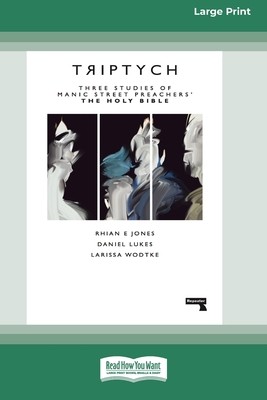
- We will send in 10–14 business days.
- Author: Rhian Jones Daniel Lukes and Wodtke
- Publisher: ReadHowYouWant
- Year: 2018
- Pages: 680
- ISBN-10: 0369386841
- ISBN-13: 9780369386847
- Format: 15.6 x 23.4 x 4.3 cm, softcover
- Language: English
- SAVE -10% with code: EXTRA
Reviews
Description
Manic Street Preachers were and remain one of the most interesting, significant, and best-loved bands of the past thirty years. Their third album The Holy Bible (1994) is generally acknowledged to be their most enduring and fascinating work, and one of the most compelling and challenging records of the nineties. Triptych reconsiders The Holy Bible from three separate, intersecting angles, combining the personal with the political, history with memory, and popular accessibility with intellectual attention to the album's depth and complexity. Rhian E. Jones considers The Holy Bible in terms of its political context, setting it within the de-industrialised Welsh landscape of the 1990s; Daniel Lukes looks at the album's literary and artistic sources; and Larissa Wodtke analyses the way the album's links with philosophical ideas of memory and the archive.
EXTRA 10 % discount with code: EXTRA
The promotion ends in 18d.07:50:25
The discount code is valid when purchasing from 10 €. Discounts do not stack.
- Author: Rhian Jones Daniel Lukes and Wodtke
- Publisher: ReadHowYouWant
- Year: 2018
- Pages: 680
- ISBN-10: 0369386841
- ISBN-13: 9780369386847
- Format: 15.6 x 23.4 x 4.3 cm, softcover
- Language: English English
Manic Street Preachers were and remain one of the most interesting, significant, and best-loved bands of the past thirty years. Their third album The Holy Bible (1994) is generally acknowledged to be their most enduring and fascinating work, and one of the most compelling and challenging records of the nineties. Triptych reconsiders The Holy Bible from three separate, intersecting angles, combining the personal with the political, history with memory, and popular accessibility with intellectual attention to the album's depth and complexity. Rhian E. Jones considers The Holy Bible in terms of its political context, setting it within the de-industrialised Welsh landscape of the 1990s; Daniel Lukes looks at the album's literary and artistic sources; and Larissa Wodtke analyses the way the album's links with philosophical ideas of memory and the archive.


Reviews